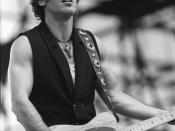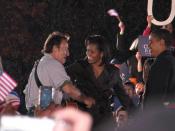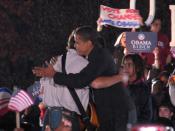Popular musicians often turn out to have a great deal of insight into complex social issues that one might not expect given the way that a lot of them carry themselves. The white establishment constantly rails against rap music, while young African-Americans claim that a lot of it speaks directly to their hopes, fears and concerns. Woody Guthrie, the composer of "This Land is Your Land," could at points in his life have been identified as a socialist. Scrawling "This Machine Kills Fascists" on his guitar and duct-taping his own mouth shut to stand that way on a New York street corner was only one of many bizarre and courageous political escapades undertaken by the godfather of American folk music.
And while, traditionally, both rap/r&b/hip-hop and folk have been marginalized commercially and the public's attention rarely lights on them for long, rock legend Bruce Springsteen has quietly, tactfully brought sociological and political messages into his music for years while still achieving the kind of commercial success that "cause" acts like Phil Ochs and Rage Against the Machine have traditionally failed to achieve.
The role that gender plays in Springsteen's music is one of the most interesting aspects of his songwriting; many of his narrators' voices are asexual or anonymous, and the companions and relationships to which they refer could be interpreted in a number of ways, as well. In his 1975 song Backstreets, Springsteen's nameless narrator refers to his friend Terry, with whom he had one of those remarkable relationships of youth that was so full of passion that nothing seemed to matter--but that when it ended the narrator was left devastated and feeling betrayed:
"Blame it on the lies that killed us, or the truth that ran us down/You can blame it all on me, Terry, it don't...


